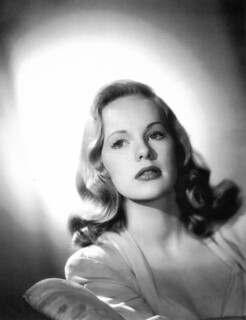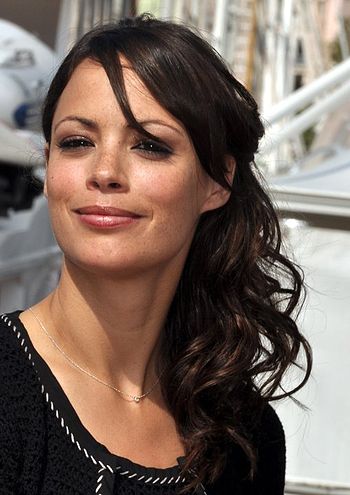by Dean | Sep 22, 2019 | General
Bart (John Dall), one of the central characters in 1949’s Gun Crazy, has always been obsessed with guns but horrified of killing. He begins a love affair with a sharpshooter-entertainer, Laurie (Peggy Cummins), who admits to being “no good,” by which she means she is disposed to steal and, worse, will kill out of fear. And she does get fearful as the two embark on a life of armed robbery.
The suggestion could be made that the film deals with America’s love for guns except that Laurie is supposed to be from London. Besides, was there ever any talk of America’s love for guns in 1949? No, Gun Crazy is a thriller about two individuals who are gun-crazy enough to turn to armed crime. It is also pretty romantic: Bart and Laurie genuinely love each other, notwithstanding a quick second of betrayal occurs at the end.
Cleverly directed by Joseph H. Lewis, this noir achievement is riveting and unpretentious. Absolutely fine in their parts, John Dall has an appealing face a trifle more friendly than handsome, and Peggy Cummins has a face with a schoolgirl charm and an overall gorgeous appearance.

Peggy Cummins (Photo credit: classic film scans)
by Dean | Sep 19, 2019 | General
That it boasts sophisticated dialogue and was filmed in Italy is nearly enough to render the American film, Beat the Devil (1953), by John Huston, an art-house adventure story—or, put another way, a minor work of art. It stars Humphrey Bogart and, because of its second half, is in my view a failure. The first half is sparkling and intriguing, the second half thin and trivial. The only two reasons I watch Beat the Devil is to hear that dialogue (not without plenty of wit) and to see the sheer pulchritude of Jennifer Jones and Gina Lollobrigida. But the genuinely good Huston movies of the 1950s, I say, are The Asphalt Jungle and The African Queen.
by Dean | Sep 16, 2019 | General
A Friend of the Deceased, from 1997, is yet another movie about economic troubles in Central and Eastern Europe, this time in post-Soviet Ukraine. It has a fairly happy ending, but before we reach it there are messages about the gangster-style cheapening of human life and people living practically for the bare necessities. There is also one about hopeful living, though.
Directed by a twosome, the film is a trifle unsteady but still smart and involving.
(In Ukrainian with English subtitles)
by Dean | Sep 15, 2019 | General

Image via Wikipedia
The morally healthy Bella (2007), by Alejandro Gomez Monteverde, is a charitable failure. It’s unaccepting of abortion–unlike its pregnant main character Nina, well acted by Tammy Blanchard.
Nina doesn’t want the baby inside her, but receives manly compassion and then some from a chef and ex-soccer star called Jose (Eduardo Verastegui). The screenplay, I regret to point out–why did it take three men to write it?–is careless, basically ramshackle. One wonders whether Jose’s accidental killing of a child, wrenching as it is, would actually induce the man to give up a lucrative pro soccer career and become a chef. One wonders, really, how Nina could have been so feckless as to get pregnant by a fellow she cares nothing about. I’m not sure I know what’s going on in Monteverde’s film.
Ostensibly Christian, presumably spiritual, Bella is in truth pseudo-religious. Jose may or may not be a genuine Christ follower; it isn’t clear. The movie is not exactly a Francois Mauriac novel, or even Au Hazard Balthazar. If it were, it would possess a brilliance consistently missing from evangelical fiction films.
by Dean | Sep 11, 2019 | General
It shouldn’t be this way, but every time a good deed is done in the “inspiring” It Could Happen to You (1994), it seems ersatz. In large part this is because Nicolas Cage, in this Capra-like little film, lacks the liveliness and purity of heart of, say, James Stewart in Capra’s It’s a Wonderful Life. Both are morally encouraging guys, but only one is truly authentic.
Ah, but Andrew Bergman‘s movie needs more verity in any case. There is third-rate characterization in Rosie Perez‘s role, and an ending more moralistic than moral (with the punishing of both Perez and Stanley Tucci). The acting is often a letdown except for that of Bridget Fonda, who provides the only depth the film possesses. One critic opined that Fonda “isn’t at her best” in It Could Happen to You. What nonsense. She is superlative.
by Dean | Sep 9, 2019 | General
Lucian Pintilie‘s 1994 comic tragedy, An Unforgettable Summer, begins, or almost begins, with the Romanian commanding officer of Captain Dumitriu (Claudiu Bleont) putting the moves on Dumitriu’s wife, Marie-Therese (Kristin Scott Thomas), before the captain’s very eyes. Marie-Therese, however, spurns the gent and Dumitriu requests a transfer to a new garrison. Sullenly the commanding officer dispatches the captain and his brood to the dry, barren and awful Romanian border. (The time is 1925.) All in all, the C.O. has coldly bullied Dumitriu.
On the border, by and by, eight Romanian soldiers are murdered by bandits believed to be Bulgarian. A small group of Bulgarian peasants maintains that the bandits are Macedonians, but the Romanians don’t listen to them. They know the peasants are not the bandits, but they proceed to beat them in the hope of getting information—even as the odd charade of the peasants’ tending Dumitriu’s vegetable garden (for pay) is initiated. As it happens, the peasants are intended for execution, which throws Dumitriu into a distressing inner conflict and Marie-Therese into shock and desperation.
So again there is bullying: political and military bullying. Behind it is lust—for women, for retaliation, for power over others. A tide of legal aggression can be opposed only with reluctance.
As director and scenarist, Pintilie has adapted a novel titled The Salad. His direction is terrifically shrewd and ambitious, and, although we don’t need to see the uninteresting body of Kristin Scott Thomas in the nude, Summer is magnificently acted. It is a film about military violence as dark, I’d say, as our 18-year-old war in arid Afghanistan.
I have seen this film on VHS and, free of charge, on YouTube.
(In Romanian with English subtitles)
by Dean | Sep 5, 2019 | General
Bruce Beresford, once again, directed perceptively when he made Mister Johnson (1990), which stars Maynard Eziashi as a black man in British Colonial Nigeria who aims to live the good life. But there is no good life when the person himself is not good and when he is thrust into misfitism by an arrogant and insulting colonial power.
Mr. Johnson identifies as an Englishman but, well, he could never become a gentleman. He is a thief; he embezzles and excessively borrows money. He values getting rich above all else. Moral ambiguity is as thick as London fog here. Johnson suffers more from his illicit choices than from pervasive racial prejudice. In a powerful, stunningly natural performance, Edward Woodard enacts a complex bigot—one who becomes a black man’s victim.
Based on a Joyce Cary novel, Beresford’s film was adeptly screenwritten by William Boyd, with palatable acting by Eziashi, Pierce Brosnan (as an admirable colonial), and Beatie Edney. A handsome-looking production, it is just as impressive as the director’s Breaker Morant and Rich in Love.
by Dean | Sep 2, 2019 | General
Did an affair between Marie-Anne (Berenice Bejo) and the married Samir (Tahar Rahim) compel Samir’s depressive wife to try to commit suicide? This is the central question in The Past (2014), a film by Iranian director-writer Ashar Farhadi (A Separation) and one set in contemporary France.
The grip of the past is the most important theme here, but there are others: the complications produced by what could be called the lust for love, even marital love; when divorce, however inevitable, fails to bring finality; the innocence of children over against the culpability of adults. Though morose, it is a brilliant and probing film by a gifted man. And his cast doesn’t let him down. Bejo never sounds a false note at somberness or emotional outburst.
(In French with English subtitles)

Français : Berenice Bejo au festival de Cannes (Photo credit: Wikipedia)
by Dean | Aug 31, 2019 | General
Eddie Darrow, played by Tony Curtis, is sent to Macao, which borders China, to bring back to the U.S. a gangster’s ex-wife (Joanne Dru) because of the money she possesses. There are prodigious difficulties, though, because 1) the ex-wife (Christine by name) is Eddie’s old flame and 2) she is now the fiancee of Justin, a Macao casino owner. And here we have Rudolph Mate‘s Forbidden, from 1953.
This is a very likable movie, but I wish fewer entertainment films strained credulity, as Forbidden does quite often. (Aw shucks, Christine overheard Eddie’s cock-and-bull story to an American gangster [a story the gangster was prepared to believe] about how he planned to deceive her.) But when it doesn’t strain credulity, William Sackheim’s screenplay is gratifying. The film is robust—if not, I’m afraid, a masterpiece of acting. Curtis is mediocre. Dru gives a merely routine performance although, along with being beautiful, she is as classy-looking as a human being can get. Lyle Bettger, as Justin, knows how to be debonair—and memorable.
by Dean | Aug 28, 2019 | General
The 2018 Mission: Impossible—Fallout is another top-notch action picture in the long-lived saga. Near the end there are the unkillable bodies of the good people (especially Tom Cruise‘s Ethan Hunt) amid mountains in Kashmir, which is fine. But the film is probably more satisfying when it is set in France and duly doubles down on The French Connection—the car chase, I mean. And, to me, it was pleasing to see Ethan, perplexed about how to save a struck-down policewoman’s life, pull out a simple handgun and shoot every single man disposed to commit murder.
The cast isn’t great, it’s perfect. Perfect for an MI movie. Henry Cavill does not disappoint as a nefarious double agent, and Vanessa Kirby, very good-looking, is seductively adroit as The White Widow. Unlike Cavill, she gets to keep her British accent.
Written and directed (without in-your-face obtrusiveness) by Christopher McQuarrie.







